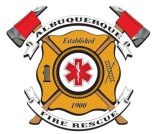Mayor Tim Keller Albuquerque Fire Rescue Implementing Cancer Prevention Procedures for Firefighters
November 28, 2018
Today Albuquerque Fire Rescue along with Mayor Tim Keller announced procedures that are being implemented throughout the department to prevent cancer among firefighters. Cancer is now the leading cause for line of duty deaths among firefighters across the country.
“Cancer has caused 61 percent of the career firefighter line-of-duty deaths in this Country from January 1, 2002, to March 31, 2017 according to National statistics,” said Albuquerque Mayor Tim Keller. “This hits close to home in Albuquerque as we have eight active firefighters, some in their 20’s and 30’s who have been diagnosed with cancer.”
Firefighters have a nine percent higher risk of being diagnosed with cancer and a 14 percent higher risk of dying from cancer than the general U.S. population, according to research by the CDC/National Institute for Occupational Health and Safety (NIOSH). With such devastating statistics, Mayor Tim Keller and Albuquerque Fire Rescue Chief Paul Dow went to work on implementing best practices in reducing harmful exposures that firefighters face every day. AFR has implemented the following practices within the last year and intend on continuing efforts in this risk reduction;
- Interstitial Spaces: We have installed an interstitial space between apparatus bays and living quarters to further contain apparatus exhaust outside of crew quarters. We are utilizing the money from our 2017 GO Bond allocated for Facility Rehab & Renovation. This project requires two doors to separate the apparatus bay from the area where firefighters live inside the firehouse. Diesel exhaust fumes are a known cancer-causing carcinogen, and this lessens the chance of contamination inside the living quarters. The department has 22 fire stations and the last one will be completed next week.
- Decontamination Procedures: Crews of fire station 1 B-Shift have developed policy for our members to decontaminate their gear and equipment at the fire scene. The policy outlines procedures to brush off debris and soot from the gear and the process to have it cleaned by our Logistics Division. This will reduce the likelihood of the firefighters tracking carcinogens inside the apparatus and into the firehouse. Each apparatus is also provided with wet-wipes for firefighters to clean the soot from their face and neck.
- New Flash Hoods: We also received the FY19 NM Fire Protection Grant in the amount of $89,824.50. With this funding, AFR will purchase 800 new NFPA compliant flash hoods and 145 structural helmets. Every member of AFR will be issued a new flash hood, and the remainder will be placed into the flash hood exchange program. These new hoods provide an added level of protection from contaminates and are compliant with the most current National Fire Protection Association (NFPA) standards.
- Annual Medical Exams: NFPA provides guidelines regarding medical programs for fire departments and recommends annual physicals for prevention of disease. The standard’s purpose is to reduce the risk of fire service occupational morbidity and mortality while improving the safety and efficiency of firefighters. Starting in January of 2019, the department will require each member to complete an annual medical exam rather than every other year. These annual physicals will be compliant with NFPA 1582.
- Washers and Dryers: Many times our firefighters t-shirts and pants are also contaminated after responding to a structure fire. We do not want these firefighters to bring the contaminated clothing home to their families. Therefore, we have developed a plan to install washers and dryers in the fire stations for firefighters to wash their clothing. IAFF Local 244 has already secured some of the funding to start this project.
“Many years ago, having a dirty fire helmet or gear was a badge of honor; we no longer see it that way. Part of changing our practices is also changing that culture,” said Chief Dow. All members of AFR are currently receiving training on these new practices and are hoping to reduce the current firefighter cancer statistics.


